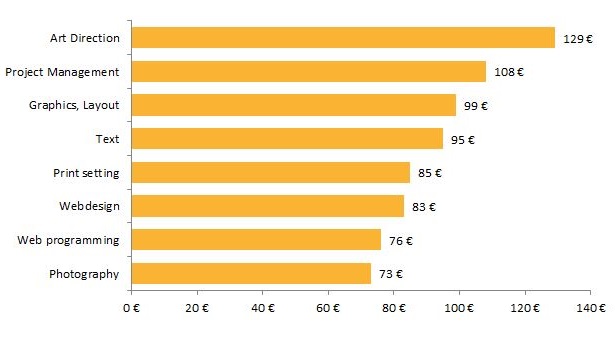How much does it cost?
I build outstanding websites with Drupal, all the while with peace-of-mind service. Once a potential customers talks to me and realizes that I am the best they can hire, one of the next questions is usually “how much does it cost?” So I want to be upfront and transparent about pricing, and explain how estimates are done. To state it right away, my rates are in line with other good freelance IT professionals, Drupal developers and agencies.
Below I will give the details, but before, you need to understand that what drives me is delivering the highest quality to you, with peace of mind service. In other words, I want to do the best possible job for you, and I want you to be happy with the result and process.
I lay down that my works ranks with some of the best Drupal development that you will come across, and is on par with the great internet or Drupal agencies – in fact, it often is better.

For that reason:
I don’t compete on price, but Quality – delivering the best product and service.
And so, I’ll be the first to admit that you will always be able to find somebody cheaper than me -- but you will be hard pressed to find somebody better.
“But… ”, you may object, “maybe I just want it done cheap!” I understand, but truth be told, you’ll probably short-change yourself. You see, in software engineering, there is a saying:There are three types of software service: Fast, good, cheap -- but you can only pick two. Of course, everybody wants fast, good, and cheap, but that is a fantasy: Hiring cheaper but less experienced developers is a recipe for disaster, because they rarely produce quality systems and often take longer; in the end, you’ll end up paying more to fix the system.
Remember this: you always get exactly what you pay for.
The reality is: You can’t have a quality system, in a timely fashion, and have it super cheap at the same time. So these are your choices:
- Fast and Cheap, but not good.--I don’ t do that, period.You deserve the best.
- Good and cheap, but not fast –which mean work gets done only between projects that pay more. Sorry, I’m pretty well booked ☺
- Fast and good, but not super cheap. -- I live here, because it gives you the best system and service.
With me, you will always get the best system and support, even better than many good Drupal agencies (see here):
- quality work
- great service
- good turnaround
- good accessibility
- at a reasonable price.
To sum it all up: You will get a quality Drupal system, with peace-of-mind service.
How much does a website cost?
“OK," you say, "I got it: you do great work, and I do want the best working for me, too. So then, how much does a website cost?” Let me put this in some other terms: How much does a new car cost? You see, there is no standard answer because no car is the same. A hand-build Ferrari costs more than some assembly-line entry-level car, etc. But a Ferrari also comes with more features. You get the point.
The same is true for websites: you can have anything from a standard “run of the mill” brochure website to a highly customized site with e-commerce, responsive mobile design, multi-lingual, etc.
So what’s a fair hourly rate for a good web developer? Let me fist give some context: Since I compared websites to cars earlier, how does web-development compare to, say, car repair? Recently I went into a car repair shop, and saw these prices posted (2017):

Not so cheap, right? Now let’s compare this “real world example” to websites. Remember that a website is a living, breathing system that can potentially make you money and represents you or your business. If think about it that way, what is the value of that? Here is a graphic that shows average hourly rates at internet agencies (2015)

Having said all that, most small to midsize website projects I work on run between 2000 (for a supereasy site) and 10000 Euros/USD. Larger and more complex sites that need all kinds of custom development like e-commerce or business logic can run higher, often significantly. But for many customers, that is the initial range.
How exactly do you come up with a price? Or how are projects estimated?
I sell my work as quality with peace-of-mind service.One important goal that is implied here is that I do remarkable work for you; another is that I want to have a great working relationship with you: I don’t want to do just this one project for you, I want you to be so satisfied that I continue serving that project and all your others as well: Peace of mind service!
TRUST,
in fact, mutual trust: I want you to trust me that I do good work for you, at a fair price, and that I will not rip you off. Likewise, I want to trust you that you will treat me fairly as well.
With most of my customers, the relationship typically evolves to the point where I just work on an hourly basis. If desired, I give rough price estimates ( “ballpark price”), and then work closely with the customer as I develop, giving frequent updates to keep the cost in line. Working that way lets us adopt easily if new information becomes available and leads to a better product.
In my experience, that is the fairest way: it is win/win for both sides, keeps both sides happy, and gives the customer the best product.
However, I understand that new or institutional customers sometime want to know a fixed or “all inclusive” price for the project. In that case, the project has to be formally estimated.
Now let it be known: software cost estimation is a black art. It really IS hard, because every project is different. I tend to be pretty good at estimating, so let me explain the process.
First you have to understand that a fixed price project can easily become a losing proposition for one side:
- If estimate way too high and it runs significantly cheaper, then I win: the extra is profit. In that case, you won’t be happy; and I don’t want to rip you off.
- If I severely underestimate, then you win; I will have to work for free for part of the project. In that case, I won’t be happy and may not want to continue working with you.
So it’s important to get the estimate right. To do this, I use the following process, which has proven to be fairly exact:
I start by breaking down the project into a number of tasks. I then assign each task an initial estimate, weighted by a level of confidence factor. Then I add various overheads such as project management, server setup, configuration management, testing, deployment, and a buffer to catch any unforeseeable problems. Adding all this up, I come up with a min/max range, from which I pick a reasonable price.
In all of this there are two variances that help guard against unforeseeable things: the level of confidence factors that I assign to each task, plus the project buffer in the overheads. The former guards against estimating the task wrong, the latter against overseeing something bigger in the whole project.
These two variances are my insurance against underestimation, because I carry all the risk here, and are the price you pay for getting a fixed project. So it’s a tradeoff, but it is aimed to make it fair for both of us. Most of my estimates are actually quite accurate, or at least, give a very accurate range that typically holds up during the build.
Now, habing explained all that, I must add: formal project estimation is very detailed and involved work; it takes quite a bit of time (a minimum of 3 hours), so if you ask me to estimate your project, I will have to charge for that.

